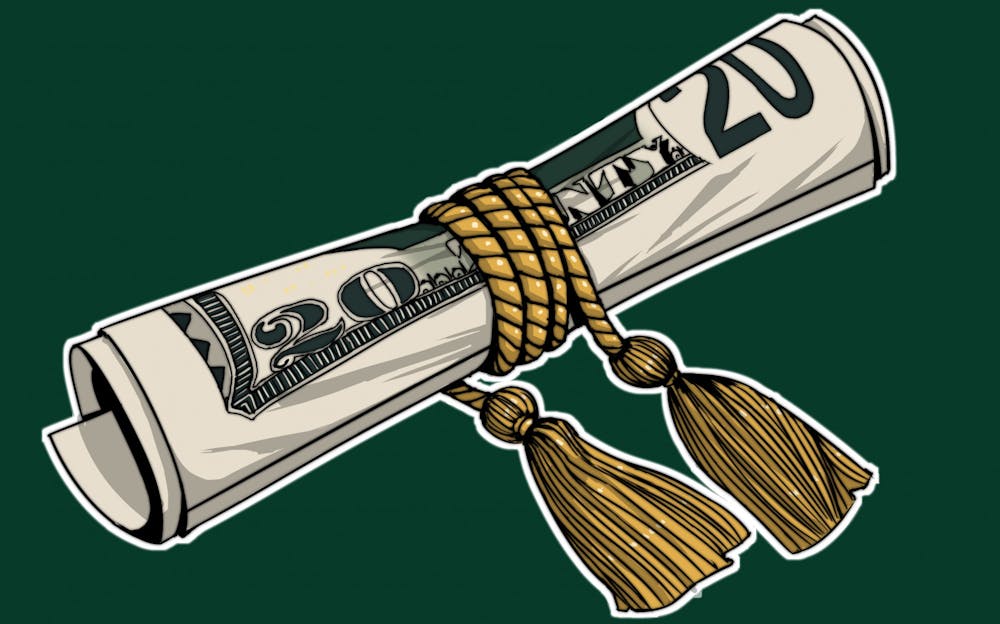While Samantha Aley hopes to be a teacher until she retires, she said that she worries about Arizona's teacher retention and its impact on her future career.
"It's possible that I could change my mind simply because of the depressingly low salary for teachers, the issue of having to fund my own classroom resources and having to deal with 30 or more students in the classroom with no support," said Aley, a junior majoring in elementary education.
For this upcoming general election on Nov. 3, Aley is a fervent supporter for Proposition 208, an initiative resulting from Arizona's Invest in Education Movement.
The proposition would raise income taxes by 3.5 percentage points on those with an income greater than $250,000 for single filing and $500,000 for joint filing to generate additional funding for education statewide, including hiring more teachers and raising base pay for those positions.
The revenue will be distributed to public school districts, charter schools and Arizona state schools for the deaf and blind, based on weighted student count of the districts and charters.
Armando Montero, candidate for Tempe Union School Board and a sophomore studying economics, political science and mathematics at ASU, said that it is time for Arizona to start investing in education.
"Ever since 2008, our public school system has been systematically defunded," Montero said. "It's important that we properly fund them, and investment in our public schools as an investment in our economy."
Support for the bill comes primarily from the Democratic Party, including State Superintendent of Public Instruction Kathy Hoffman, who tweeted in August, "Let's get to work to #InvestinED!" supporting the ballot initiative.
The proposition also outlines funding for investing in Career and Technical Education.
The goal of CTE is to allow Arizona students to gain experience in relevant fields to bring more qualified workers into the workforce.
Former member of the Arizona State Legislature and current Director of The Arizona Center for Economic Progress David Lujan said Prop 208 would raise "an estimated $112 million annually in new funding for CTE education," which he said would "more than double the current state funding."
Prop 208 would also designate funding for mental health resources provided through additional support personnel for schools.
Montero said that there is a long way to go in destigmatizing mental health, but "as far as what a policy initiative can do, being able to allocate money and to recognize those departments, this is a step in the right direction."
However, those against Prop 208 cite concerns over the impact it could have on small businesses.
No on 208, a campaign paid for by Arizonans for Great Schools and a Strong Economy, claims the increase in taxes will hurt the already damaged private sector of Arizona that is already dealing with the COVID-19 pandemic.
"(Prop 208) comes at the worst possible time, as we are in the midst of a pandemic that has hobbled the state's and nation's economy," said Garrick Taylor, spokesperson for the No on 208 campaign and the executive vice president of the Arizona Chamber of Commerce and Industry.
Taylor and others in the business community believe that Prop 208 would be detrimental to small businesses even without the pandemic.
Chad Heinrich, the state director of the National Federation of Independent Business in Arizona, said, "(small businesses) are paying the income taxes on the revenue from their businesses through their income tax returns."
Most small businesses operate through a pass-through entity. With a pass-through entity, businesses do not pay a corporate tax. Instead, the owners pay their shares of profits through their individual income taxes.
"This tax will hit them directly on their first return, where all their business revenues and expenses flows," Heinrich said.
Taylor said business leaders support funding education and supporting teachers, citing past support of Prop 123 from the business community, which put $3.5 billion toward K-12 education, just not this proposition and not during current economic times.
"It has been probably one of the most misreported stories in Arizona that somehow the business community has been sitting on its hands when it comes to education," Taylor said.
Since early 2018, when the Red for Ed movement moved through the nation and led to school teachers striking for higher pay and more in-class resources, education funding has become a hot issue in Arizona, a state that consistently ranks toward the bottom of education in the country.
The U.S. News and World Report ranks Arizona as 44th in the nation in K-12 education.
"The past several years, we've seen calls from students, teachers and parents alike for the state legislature and the state, in general, to fund our public schools properly," Montero said. "That's exactly what this initiative does. It puts the required funds to support our educators and support our students."
While the bill focuses on K-12 education, Lujan emphasized the proponents' desire to see college students vote in favor of the bill.
"College students who went to school here in Arizona know that they went through a public education system that was in the bottom 10 in the country," Lujan said.
Aley said she understands people are hesitant to vote on a tax increase. But ultimately, Prop 208 would be providing "educators the funding they need and deserve."
"I would not hesitate to vote yes for Prop 208 because I would know that my taxes are going to people who need it: educators, students and anyone who works at Arizona public schools," Aley said.
Correction: A previous version of this article stated that income tax would be raised by 3.5% instead of 3.5 percentage points. The article was updated at 2:30 p.m. on Oct. 1 to reflect the change.
Reach the reporter at drodish@asu.edu and follow @david_rodish on Twitter.
Like The State Press on Facebook and follow @statepress on Twitter.




